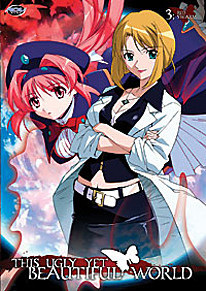Review
by Carl Kimlinger,This Ugly Yet Beautiful World
DVD 3: Red Swarm
| Synopsis: |  |
||
Hikari finally remembers her mission; trying to ignore it, she tears herself apart inside. But fate is hardly kind, as it deals Hikari's newborn human heart a fatal blow in the form of an insoluble romantic dilemma. So Dark Hikari rises again and, deliberately cutting her ties with Takeru, she commences her deadly duties. The world is stained red as the dawn of the next great extinction breaks. |
|||
| Review: | |||
This Ugly Yet Beautiful World draws to a close, opting, in its final chapters, for an understated climax that is odd (and oddly appropriate) for a show about the impending obliteration of life on Earth. There are no grand battles for the fate of humanity, no clearly defined villains or heroes, and no violent conflicts (although, as in volumes past, there are a few brief, exciting action set-pieces). The focus here, as it has been all along, is on the interior worlds of the protagonists, not on the greater context. It's a strategy that pays off handsomely, in the form of several highly affecting (and occasionally brutal) moments of personal revelation, realization, and acceptance. Hikari must reconcile her newfound humanity with her role as destroyer, just as Mari must accept the direction of Takeru's affections, and Takeru must accept not only that his conception of romance is warped, but also Hikari's sharp deviation from his fear-fueled ideal of womanhood. The real spectacle isn't the blood-colored butterflies or monstrous life-forms (as awe-inspiring as they are), but rather the delicate dance of two desperately inexperienced, naive, and terrified young people coming to grips with the cost, risk, and compromise of a relationship. It's unlikely to drive anyone to tears, but it will undoubtedly pluck a few odd heartstrings and will certainly (the horror!) make you think. The focus (and climax) may be character- and emotion-driven, but this isn't to say that the big picture is ignored. This volume clears up many of the niggling questions that have persisted: Hikari's true nature and Akari's role in their mission, the source of Takeru's powers, and the reason for the disparate personalities adopted by the two girls are all revealed. Everything gets tied into the mass extinctions of millennia past, and even the butterfly motif of the opening gets a solid explanation. The show's understanding of evolutionary biology is frighteningly simplistic, and details of the mass extinctions border on pseudoscientific mysticism, but this doesn't greatly affect the quality of the show and the visual payoff more than compensates. Gainax is well known for their fluid, sometimes unconventional animation, so the real surprise here isn't that the animation is impressive—Ioneos' transformation, an aerial pursuit, and the swarms of blood-red butterflies are all standouts—but that the director purposefully de-emphasizes it. The animation is quite competent overall, but there isn't anything as showy as the fights from previous episodes. Instead, the most memorable moments come from meticulously composed, flawlessly employed, high-contrast symmetrical compositions. The play of red against blue is used to particularly stunning effect. Other aspects of the artwork are all up to Gainax's usual standards; settings such as a skeletonized forest, the town, and even a junkyard are visually pleasing at worst, and gorgeous at their best. The Mahoromatic-esque character designs are definitely female-centric. Hikari, Akari and the rest of the female cast—with their round faces, liquid eyes, and colorful hair—are distinctive, attractive, and memorable—especially Hikari and Akari's cosplay-ready clothing. Male characters are far less appealing, bordering on plain—although Takeru's half-transformed state is strangely pleasing. And, sorry oglers, this volume is almost (if not quite) nudity free. While Tsuyoshi Watanabe's score isn't going to impress anyone, it is competent and appropriate. The majority of it is traditionally cinematic string and piano music, but Watanabe underlines moments of emotional confusion with discordant strings and percussion, and he knows when to break out the guitars to give the action a boost. The opening song is... well, great (and beautifully choreographed with the imagery); the peppy closer unfortunately pales in comparison. ADV's English interpretation is thoroughly professional, but just slightly uninspired. The script sticks close to the subtitles, with just enough looseness to make delivery acceptably smooth, and to allow the actors to have a little fun (including a female clerk that I could swear is a man). Hikari's dual personality comes across well, and the other roles are appropriately cast, if not stellarly acted. Overall the dub lacks the color of the original Japanese, perhaps because it is a little too underplayed for its own good. Note to those who haven't watched the Japanese version: Yes, the opening narration is just as hideously annoying in the Japanese. Boring on-disc extras for this outing: clean opening and closing, a Japanese advertisement, and ADV previews. Interesting extras: informative translator's notes that explain some of the hairier translation problems and cultural references, and an always-welcome half-hour Japanese television interview with director Shouji Saeki. To some, this quiet, unusually introspective finale might seem anti-climactic, but for those willing to put forth the effort to examine it carefully, this volume is proof positive that underneath all of the "eek! I walked in on a naked girl!" romantic-comedy hi-jinks of previous installments lurks the threads of an unflinching character-driven romantic drama. |
|
The views and opinions expressed in this article are solely those of the author(s) and do not necessarily represent the views of Anime News Network, its employees, owners, or sponsors.
|
| Grade: | |||
|
Overall (dub) : B
Overall (sub) : B+
Story : B+
Animation : B+
Art : A-
Music : B
+ Quietly affecting; unusually sharp psychological insight. |
|||
| discuss this in the forum (10 posts) | | |||
| Production Info: | ||
|
Full encyclopedia details about Release information about |
||